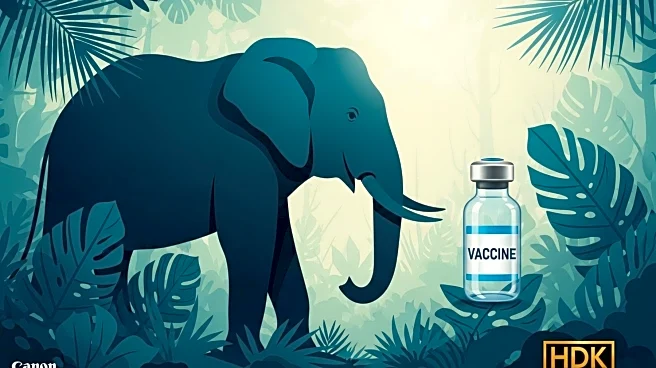What's Happening?
Researchers have achieved a significant breakthrough in developing a vaccine aimed at preventing a deadly virus that affects young Asian elephants. The virus, known as elephant endotheliotropic herpesvirus (EEHV), is a leading cause of death among juvenile elephants, particularly in zoos. The vaccine was tested on adult elephants at Chester Zoo and was found to be safe and effective in activating the immune system to fight the virus. Prof Falko Steinbach from the UK Animal and Plant Health Agency and the University of Surrey described this development as a landmark moment in efforts to protect Asian elephants. The next phase involves testing the vaccine on younger elephants, who are most vulnerable to the disease.
Why It's Important?
The development of this vaccine is crucial as EEHV has caused significant mortality among young elephants, with Chester Zoo alone losing seven baby elephants to the virus over the past decade. The virus leads to a hemorrhagic disease that can be fatal within 24 hours, with a mortality rate exceeding 80% in juvenile elephants. The vaccine's success could pave the way for protecting elephants in both zoos and their native habitats, potentially reducing the number of deaths caused by EEHV. This advancement not only aids in conservation efforts but also demonstrates the potential for designing vaccines to help endangered species.
What's Next?
The research team plans to test the vaccine on younger elephants, who are most at risk from EEHV. Additionally, they aim to simplify the vaccination process, which currently requires four injections, to make it more accessible and practical for use in elephants at risk. The ultimate goal is to deploy the vaccine in areas where it is most needed, including wild habitats and sanctuaries, to protect elephants from this deadly virus.
Beyond the Headlines
This breakthrough highlights the broader implications for wildlife conservation, showcasing how scientific advancements can contribute to the protection of endangered species. The success of this vaccine could inspire similar efforts for other species facing viral threats, emphasizing the role of veterinary science in biodiversity preservation.










